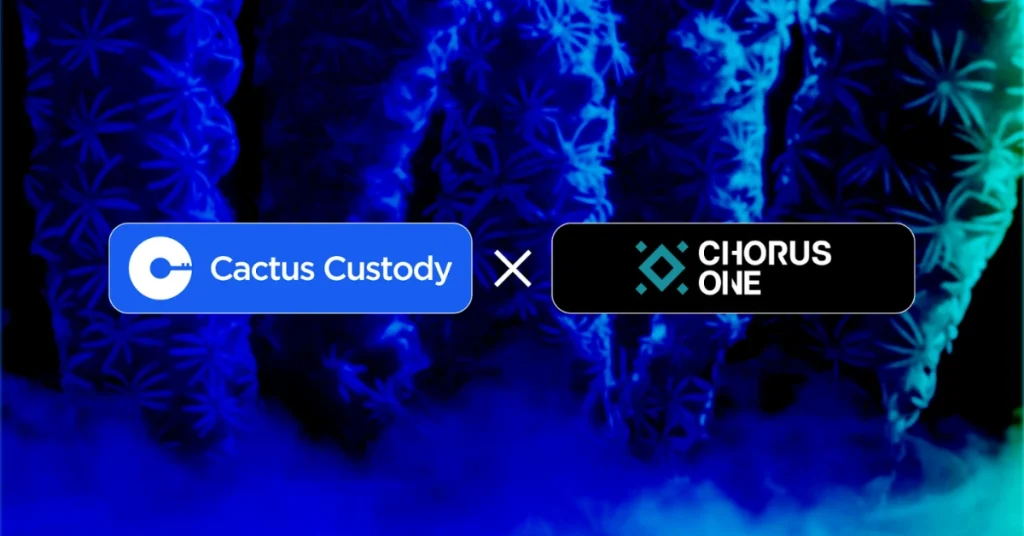
The post Cactus Custody and Chorus One Partner to Unlock the Future of Institutional Ethereum Staking appeared first on Coinpedia Fintech News
Institutional interest in blockchain technology continues to rise and the demand for secure, efficient, and compliant staking solutions has become more urgent than ever. In response to this growing market, Cactus Custody, the institutional digital asset custodian under Matrixport, has partnered with staking infrastructure leader Chorus One to offer seamless Ethereum staking via ETH Vaults. This integration—now live on Cactus Link, Cactus Custody’s proprietary wallet extension—represents a significant step toward making advanced decentralized finance (DeFi) products accessible to institutional clients.
With over $10 billion in digital assets under custody, Cactus Custody is doubling down on its commitment to provide cutting-edge blockchain tools while maintaining the highest standards of security and regulatory compliance. Through this partnership with Chorus One, institutions can now access high-yield staking opportunities with the simplicity and safety that a regulated custody provider offers.
A New Era for Institutional ETH Staking
The collaboration between Cactus Custody and Chorus One comes at a pivotal moment for Ethereum and the broader staking ecosystem. As Ethereum transitions into a mature proof-of-stake network, staking has become a fundamental mechanism for securing the blockchain and earning rewards. However, for institutions, navigating the complexities of staking—especially in a secure and compliant manner—has been a significant barrier.
Chorus One’s ETH Vaults are now available through Cactus Link. These vaults offer streamlined access to Ethereum staking strategies tailored for institutions. The partnership removes friction from the staking process, allowing clients to participate in reward-generating opportunities without dealing with the operational burdens traditionally associated with staking infrastructure.
Two standout offerings define this integration. First is the MEV Max vault, which utilizes Chorus One’s MEV-boost technology to optimize validator performance and maximize staking rewards—reportedly offering up to ~4% annual return. The second is Obol DV, a distributed validator technology (DVT) vault that not only provides Ethereum and MEV rewards but also offers incentives through the Obol Incentive Program. Both vaults are further enhanced by enabling the minting of osETH, a liquid staking token compatible with advanced DeFi and restaking strategies via Chorus’ Boost platform.
For institutions, this means staking isn’t just passive yield—it’s now part of a broader, integrated investment strategy that includes liquidity, composability, and access to DeFi tools without compromising on custodial security.
Secure Infrastructure Meets DeFi Agility
At the heart of this integration is Cactus Link, a browser-based wallet extension specifically designed for institutional DeFi engagement. Supporting nearly 30 public blockchains—including Ethereum, Solana, Bitcoin, and Cosmos—Cactus Link empowers institutions to interact with decentralized protocols while maintaining robust safeguards like hardware-based signatures, Taproot support, and approval workflows.
Unlike conventional retail wallets, Cactus Link removes mnemonic phrases and introduces institutional-grade transaction validation and auditing, ensuring compliance and operational oversight at every step. By embedding ETH Vaults into this infrastructure, Cactus Custody and Chorus One have created a unified environment where institutions can stake, earn, and manage digital assets with full confidence in both performance and security.
As the crypto industry matures, the lines between traditional finance and decentralized ecosystems are beginning to blur. With the integration of Chorus One’s ETH Vaults into Cactus Link, Cactus Custody is offering a gateway for institutions to access Ethereum staking without sacrificing compliance, security, or usability.

 1 month ago
45
1 month ago
45














 English (US) ·
English (US) ·